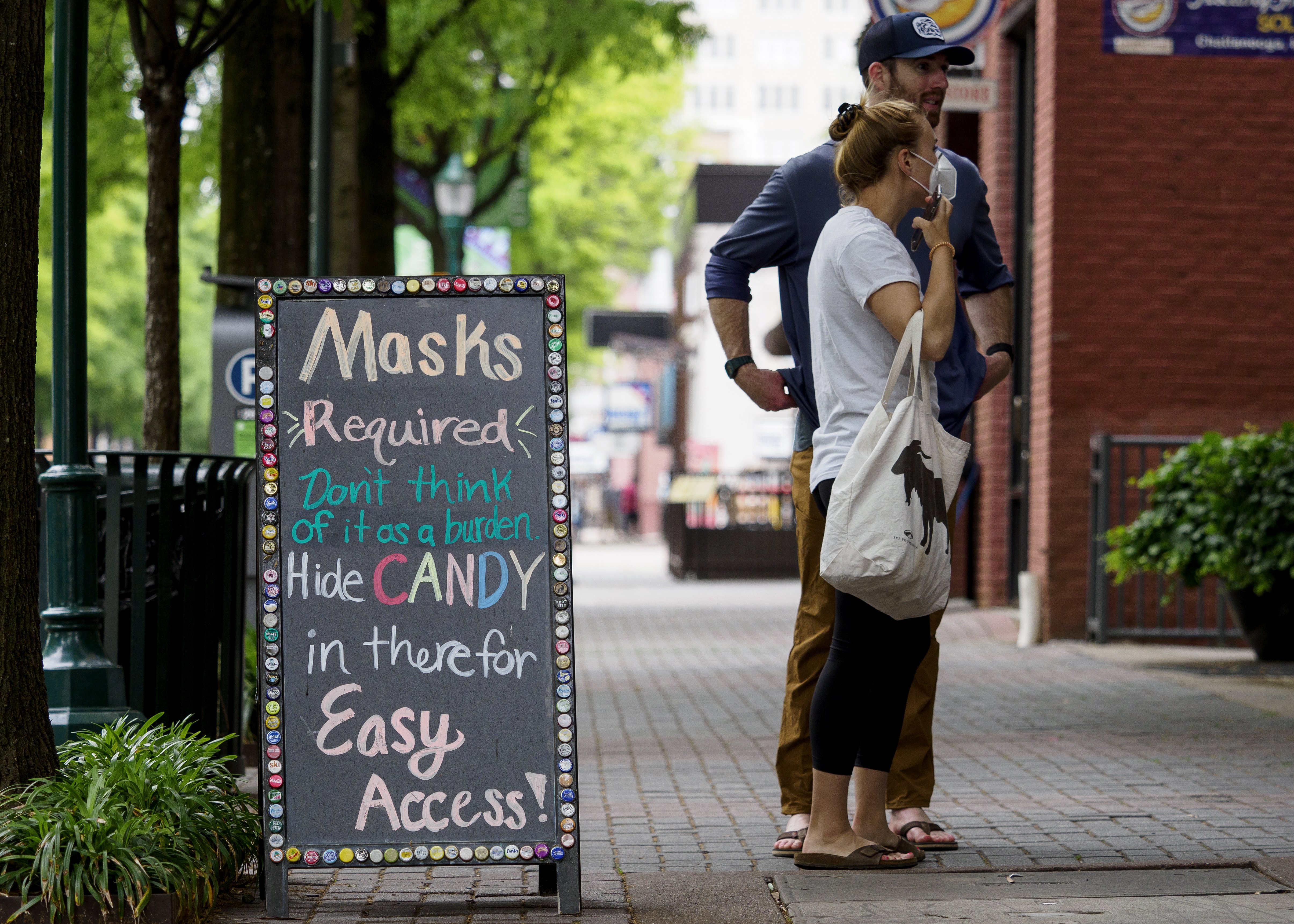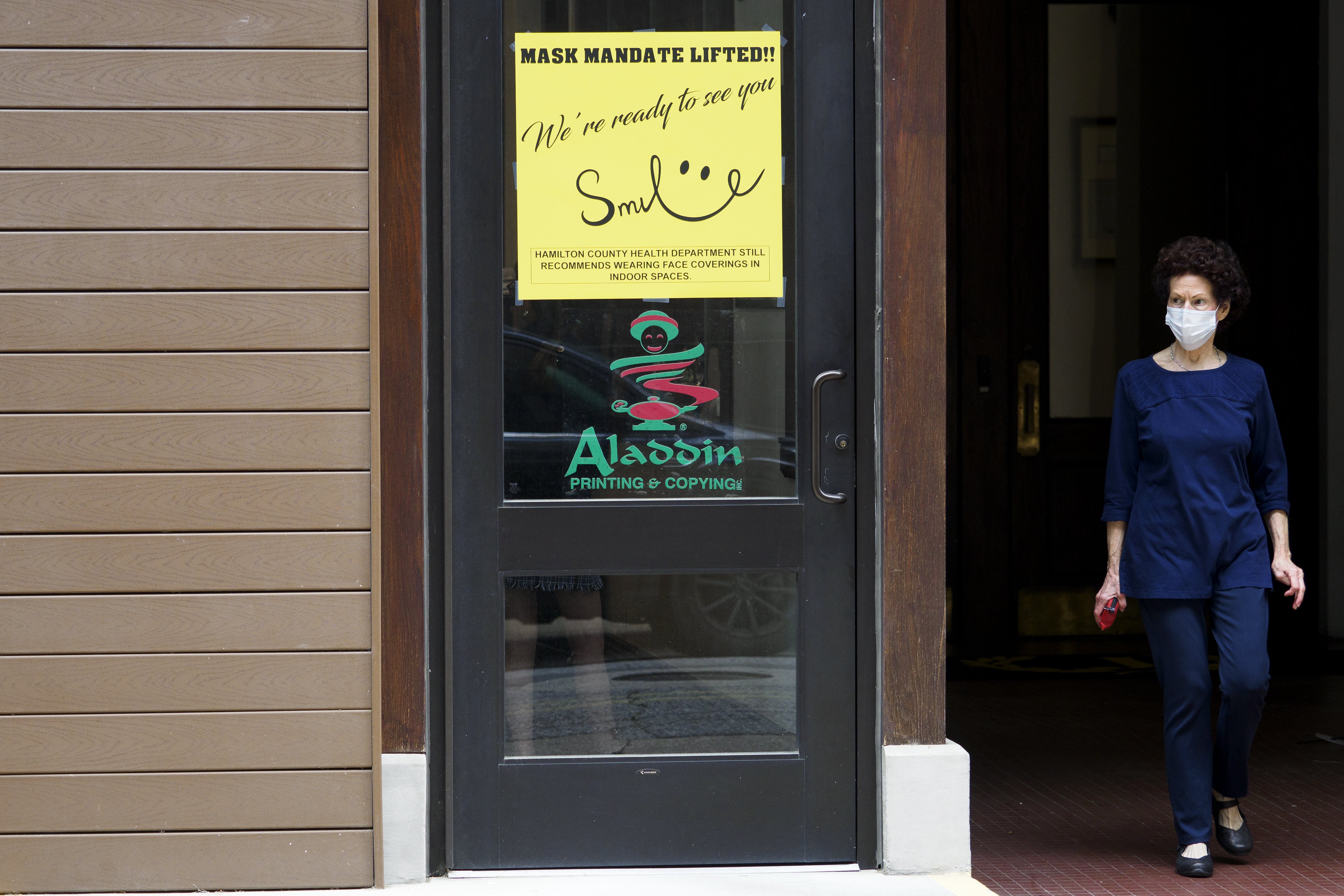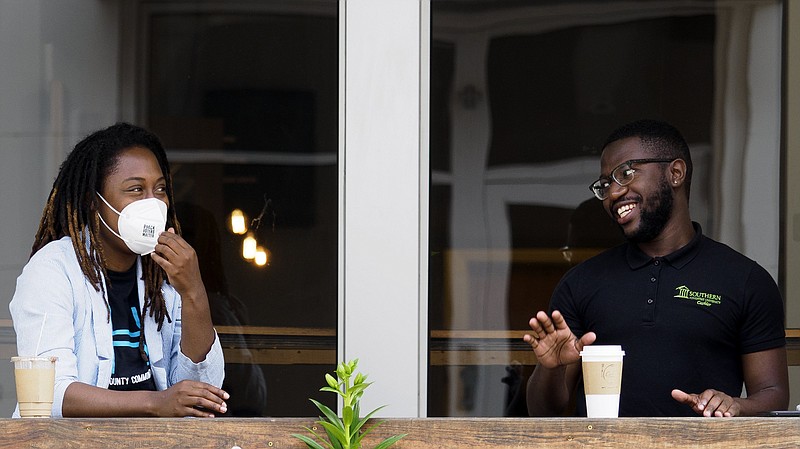For 10 months, Hamilton County was on an island. The metropolitan county in Southeast Tennessee, unlike the dozens of counties surrounding it, required face masks in public.
The decision to implement a mask mandate to curb the spread of COVID-19 was the most controversial decision of Hamilton County Mayor Jim Coppinger's 10 years in that role, he told the Times Free Press.
The Republican mayor took a stance that some constituents saw as going against their freedom-loving reasons for voting him into office. If there was ever doubt, hundreds and hundreds of angry emails served as a reminder of that.
But it was a decision supported by strong scientific evidence and some of the most respected and trusted medical experts in Chattanooga.
Coppinger stood by it five separate times.
Requiring masks was the best mitigation strategy the county had, Coppinger said, until safe and effective vaccines became available.
Masks gave businesses that had lost workers and customers due to safety concerns the confidence to open their doors. They helped children to go back to their classrooms - the best place for young minds to learn and grow socially - before any other major metro district in the state. While local hospitals neared a breaking point in the winter, data repeatedly showed that the majority of the serious cases came from surrounding counties, places not requiring face coverings.
"I would've loved for it to always have been a personal decision. I truly believe in that," Coppinger said. "But I do believe that there was a tremendous amount of obligation that we had to try to slow down the spread."
On Thursday, more than 13 months into the COVID-19 pandemic and 10 months into the mask mandate, the requirement came to an end. The order was intended to be temporary. Free vaccines are widely available now, and the most vulnerable populations were the first in line to be vaccinated, Coppinger said. There is not much else the government can provide for residents, he said.
Despite the mandate's end, local public health officials are urging residents to continue following health guidance that includes wearing masks in high-risk settings, such as indoor public spaces.
Outside experts said decisions to end mask requirements are coming too soon, especially as more people resume pre-pandemic activities, more contagious and more deadly strains are becoming the predominant strain and COVID-19 testing - which has been scaled back significantly - is yielding a high positivity rate.
"This is the wrong time, completely the wrong time," said Tim Sly, professor emeritus at Ryerson University in Toronto who specializes in epidemiology and risk assessment.
At the same time, states like Tennessee are struggling with low vaccination rates and high levels of vaccine skepticism, factors that will extend the pandemic and keep the region, and the country, from gaining the protections of herd immunity.
COLLECTIVE DECISIONS
When Coppinger implemented the mask mandate in July, the county was experiencing record numbers of new cases and hospitalizations. These records would later be eclipsed in the winter but, at the time, averaging 68 new cases a day and reporting 40 hospitalizations was alarming. The county already saw the economic damage created by widespread shutdowns. In mid-April, 1 in 9 workers in Southeast Tennessee had filed for unemployment benefits.
The public–private partnership to deploy vaccines, Operation Warp Speed, championed by then-President Donald Trump, was less than two months old. Masking was the only tool that could allow people to safely interact with others outside of their immediate household and help control the spread of COVID-19, which is more deadly than the flu. But in order for masks to be most effective, everyone has to wear them. A face mask mandate would help bring the economy back, Coppinger said.
On the surface, a government-issued mandate went against some of the core beliefs of a free market Republican like Coppinger, who favors limited government. But the former fire chief also believes the government has an obligation to protect the public and step in when people are getting sick and dying, Coppinger said.
If 10 people were killed by car accidents at an intersection in a year, residents would be screaming for the government to step in, he said. As of Wednesday, 491 Hamilton County residents and 12,171 Tennesseans had died from the coronavirus.
Pushback was swift. Two days after the mandate went into effect, anti-mask protesters gathered outside the Hamilton County Courthouse. Those at the rally described the mandate as government overreach or "the mark of the beast," a symbol of the anti-Christ and the end times in the Christian tradition.
"It's pretty simple, God gave us freedoms, and he didn't make me with a mask on my face, so I don't think anyone has the right or the ability or the right to mandate that we have to wear one," a protester told the Times Free Press.
The local pandemic response continues to face not just a deadly virus but a campaign of misinformation, largely spread online. Conspiracy theories about masks and vaccines undermined the work of public health.
"It became a very political issue and I never, to this day, understand what that has to do with people getting sick or dying," Coppinger said.
Peter Jones, an assistant professor in the Department of Political Science and Public Administration at the University of Alabama at Birmingham, said that political scientists anticipated these types of policy issues and backlash when the pandemic struck.
"All of our decisions - both at an individual level and on the collective level - have repercussions for other people," Jones said. "So as we're making these collective decisions or decisions about how to approach things, that touches on so many parts of our lives. Even the decision on whether the political process should touch on a part of our lives therefore becomes this political piece."
In the absence of a federal mandate, states and localities - which are much more diverse, politically - were left to decide for themselves whether to require face masks in public, leading to an array of different approaches.
"When people individually are unhealthy, that creates a huge burden to the public health sphere - the collective - but a lot of public health things that we enact are really unpopular at first," Jones said. "[We] don't think twice about putting on a seat belt, but it took us a couple decades."
Jones believes the politics around masks turned bitter once the science clearly backed their use and some people remained vehemently opposed to masks.
"We had this overwhelming evidence that we should be wearing masks to stop the spread of COVID. Yet, somehow, not just the discourse or the decision-making process of what we should do about that, but also just the evidence itself became divisive across political lines," he said.
The pandemic coming in the midst of a heated national election further fueled the rhetoric around masks, Jones said.
"Politicians understand that if they bring an issue to the forefront and make it politically divisive, that can help them in the political arena," he said. "If people are up in arms over something, then maybe that yields additional donations or additional support at the polls. Politicians themselves understand that you're not going to donate to their campaign if it's about some bland policy issue."
 Staff photo by C.B. Schmelter / Standing with her boyfriend, Ryan Furey, Monique Howard puts on her mask as she contemplates going into Rocket Fizz downtown on Thursday, April 29, 2021 in Chattanooga, Tenn. Hamilton County's mask mandate expired at midnight on April 28. The mandate has been described by Hamilton County Mayor Jim Coppinger as the most controversial policy decision of his career.
Staff photo by C.B. Schmelter / Standing with her boyfriend, Ryan Furey, Monique Howard puts on her mask as she contemplates going into Rocket Fizz downtown on Thursday, April 29, 2021 in Chattanooga, Tenn. Hamilton County's mask mandate expired at midnight on April 28. The mandate has been described by Hamilton County Mayor Jim Coppinger as the most controversial policy decision of his career.STANDING ALONE
Despite what his inbox said, Coppinger felt local business owners supported the mandate. People could get back to work, and individual businesses did not have to enforce a mandate themselves and risk alienating customers. The Chattanooga Area Chamber of Commerce fully supported the mandate.
In Tennessee, Gov. Bill Lee declined calls to issue a statewide mandate and instead delegated decisions on mandates to county mayors. When Coppinger announced his mandate, it put Hamilton County in the difficult position of standing alone with the requirement.
Though Alabama's governor mandated face masks statewide starting in July, no other county bordering Hamilton County in Tennessee and Georgia ever implemented a mandate. Coppinger said he was not going to change the minds of other leaders. Like Hamilton County, Alabama's order expired this month.
Data supported Coppinger's decision. A study from Vanderbilt University released in August found that hospitals treating patients mostly from areas without mask requirements saw, on average, a more than 200% increase in hospitalized COVID-19 patients, while hospitals treating patients mostly from areas of Tennessee with face mask requirements saw their number of coronavirus patients stabilize or decline.
But, with Hamilton County serving as a health care hub for the area, Chattanooga's hospitals strained under the regional surge. Already facing months of fatigue from dealing with sick patients, the local hospital system was pushed to its brink in the winter. The daily total number of hospitalizations surged into the triple digits in early November and stayed above 100 for 12 weeks.
"When people say 'I don't think it makes any difference' or whatever, it's one of those kind of intangible things," Coppinger said. "We'll never really know for sure how many people we prevented from getting sick or how many we prevented from dying. But we do know that, in our hospitals, it was not Hamilton County residents that were filling the hospitals up."
Hamilton County residents have rarely accounted for more than 55% of the daily reported hospitalizations over the past 10 months, despite being the most populous county in Southeast Tennessee and Northwest Georgia.
It is impossible to know how much worse the winter surge would have been if no mandate was in place.
Sometime in November, Coppinger noticed a shift in the tone of his emails. More people thanked him for the mask mandate. Some asked him to continue renewing the requirement. For many residents, the surge provided a glimpse of how dangerous the pandemic is.
COVID-19 was no longer something that was just on the news or the thing canceling a vacation. By that point, almost everyone in the county knew someone who had gotten very sick or even died from the virus.
 Staff photo by C.B. Schmelter / A masked woman walks past Aladdin Printing and Copying downtown on Thursday, April 29, 2021 in Chattanooga, Tenn. Hamilton County's mask mandate expired at midnight on April 28. The mandate has been described by Hamilton County Mayor Jim Coppinger as the most controversial policy decision of his career.
Staff photo by C.B. Schmelter / A masked woman walks past Aladdin Printing and Copying downtown on Thursday, April 29, 2021 in Chattanooga, Tenn. Hamilton County's mask mandate expired at midnight on April 28. The mandate has been described by Hamilton County Mayor Jim Coppinger as the most controversial policy decision of his career.IT'S NOT OVER
Coppinger said he never expected the mandate to last 10 months, but the order was always intended to be temporary. He is keeping that promise.
Vaccines are widely available, and the most vulnerable populations have access to shots, he said. Part of announcing the end of the mandate a month in advance was to give people notice to get their vaccine, Coppinger said.
Sly, who studies the spread of disease, said Hamilton County's positivity rate is too high to even consider ending the mandate. In the past week, around 10% of new tests are coming back positive, a rate that has varied little in the past two months.
Local governments should not end mitigation strategies until positivity rates are below 3%, Sly said. Public health experts have said throughout the pandemic that a positivity rate above 5% means the virus is not under control in the area.
Masks offer short-term, immediate protection against the spread of the virus while more people get vaccinated, Sly said. Vaccines are a medium- or long-term intervention against the virus. The Moderna and Pfizer-BioNTech vaccines require two doses spread weeks apart. A person who receives both doses will not have full protection for two weeks after the second shot.
Local public health leaders have called for continued vigilance against the virus, particularly to follow the U.S. Centers for Disease Control and Prevention guidelines in continuing to wear face coverings in situations with higher risk for COVID-19 exposure.
Wearing a mask and physically distancing is an effective strategy until more people get vaccinated, said Dr. Fernando Urrego, interim health officer with the Hamilton County Health Department.
Overcoming vaccine hesitancy is the next hurdle for the county. Tennessee has one of the lowest vaccination rates in the country, and research by the state department of health has found that many hesitant residents are unlikely to change their minds.
Much like the fight over face masks, Coppinger said he does not understand how the vaccine became a political issue. If someone does not want to get vaccinated for their own protection, they should get vaccinated to keep their family and friends safe, Coppinger said.
"We will constantly be reminding people the pandemic is not over," he said.
Jones said he hopes that in the future more public health and medical experts will be able to better understand and recognize the role of politics and collaborate across disciplines to help inform their responses.
"You've got to consider public policy, and having hundreds of scientific studies and all of the evidence in the world - as evidenced by this pandemic - wasn't enough," Jones said. "You've got to work with other social sciences, other types of sciences, to figure out, 'Here's the evidence we have, but how do we get folks to follow that?'"
Contact Elizabeth Fite at efite@timesfreepress.com or follow her on Twitter @ecfite. Contact Wyatt Massey at wmassey@timesfreepress.com or 423-757-6249. Follow him on Twitter @news4mass.
